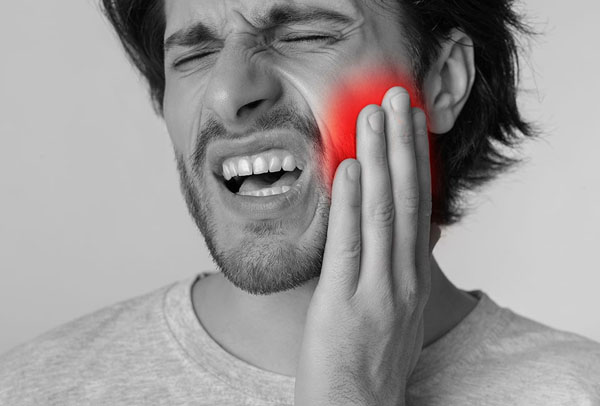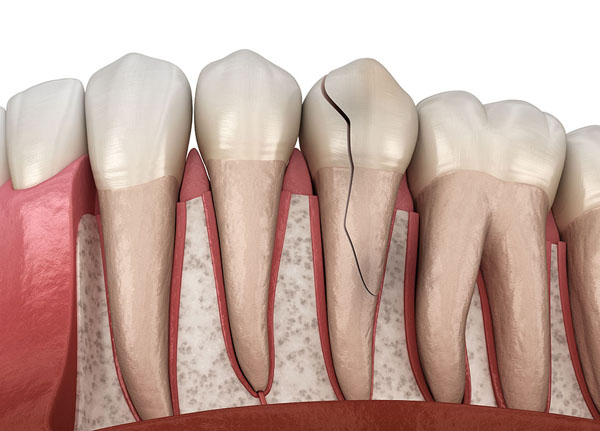Emergency Tooth Fractures and Cracks in Knoxville, TN
Restore Your Smile After Accidents or Dental Trauma
Dental emergencies involving tooth fractures and cracks can be both painful and distressing. Whether it’s a minor chip or a severe fracture reaching the root, these dental issues demand immediate attention and appropriate treatment to prevent further damage and maintain your dental health.
Our Knoxville, TN, emergency dentist is ready to assist you with cracked or fractured teeth for swift relief. To learn more about our emergency dental care services, contact our Knoxville dental office at (865) 687-8670.
Types of Tooth Fractures and Cracks
Craze Lines
Craze lines are minor cracks that occur on the tooth’s outer enamel. These are usually harmless and don’t necessitate immediate treatment. However, if they pose aesthetic concerns, dental bonding can be employed to enhance their appearance.
Fractured Cusp
A fractured cusp happens when a portion of the tooth’s chewing surface breaks away. This type of fracture typically doesn’t cause pain but may lead to discomfort during chewing. Our emergency dentist in Knoxville can restore the tooth by placing a dental crown over it.
Cracked Tooth
A cracked tooth signifies a more serious fracture that progresses from the chewing surface down toward the root. Cracked teeth can be quite painful, particularly during chewing, and may cause heightened sensitivity to temperature changes. Depending on the extent of the tooth cracks, treatment options may include a dental crown, root canal therapy, or even extraction.
Split Tooth
A split tooth characterized by a vertical division of the tooth into distinct segments. This type of fracture typically extends from the chewing surface down to the root and can cause significant discomfort. Unfortunately, saving a split tooth is often not possible, and extraction may be necessary.
Vertical Root Fracture
A vertical root fracture originates at the tooth’s root and progresses upward. These fractures aren’t visible to the naked eye and may result in sporadic pain during biting. Regrettably, vertical root fractures frequently necessitate tooth extraction.
Causes of Tooth Fractures and Cracks
Recognizing the causes behind tooth fractures and cracks can help you implement preventive strategies to safeguard your teeth. Common factors contributing to tooth fractures include:
- Dental Trauma: Incidents like accidents, falls, or impacts to the face can result in tooth fractures, particularly in the front teeth.
- Biting on Hard Objects: Using your teeth to open bottles, crack nuts, or chew on hard items can lead to dental damage.
- Tooth Decay: Neglected tooth decay compromises the tooth structure, making it more prone to fractures.
- Bruxism (Teeth Grinding): Grinding or clenching your teeth, especially during sleep, can exert excessive pressure on them.
- Uneven Bite: An uneven bite can cause certain teeth to endure more force, heightening the risk of fractures.
- Age and Wear: As we age, our teeth naturally weaken and become more susceptible to fractures and cracks.
Emergency Treatments for Tooth Fractures and Cracks
Dental Bonding
Dental bonding is a minimally invasive and affordable solution for treating minor tooth fractures, such as craze lines and small chips. During this procedure, your dentist will apply a tooth-colored composite resin to the affected area, skillfully shaping and adhering it to the tooth. This method not only restores the tooth’s appearance but also strengthens its structure, ensuring durability and protection.
Dental Crown
A dental crown, also known as a cap, is a widely used solution for restoring severely damaged teeth. When a significant portion of a tooth is compromised or when a crack reaches the root, a dental crown is frequently suggested. This procedure involves covering the entire visible part of the tooth with a custom-made crown, effectively restoring its shape, functionality, and appearance. Dental crowns are known for their durability and longevity, making them an excellent choice for addressing extensive tooth fractures.
Root Canal Treatment
When a tooth fracture extends to the tooth’s inner pulp, it can result in intense pain and heightened sensitivity. In such instances, a root canal treatment might be required to prevent the need for extraction. During this procedure, the infected or damaged pulp is removed, and the root canal system is meticulously cleaned and sealed. After completing the root canal treatment, a dental crown is typically placed to safeguard and reinforce the treated tooth.
Tooth Extraction
In certain cases, tooth fractures can be so extensive that saving the affected tooth isn’t possible. Tooth extraction becomes the necessary option when the damage is severe, the tooth can’t be effectively restored, or it poses a risk of infection to adjacent teeth. Following the extraction, your dentist will discuss tooth replacement options, such as dental implants or bridges, to restore your smile and maintain oral function.
Preventive Measures to Avoid Tooth Fractures and Cracks
Taking preventive steps is crucial for keeping your teeth healthy and steering clear of dental emergencies like fractures and cracks. Consider implementing these strategies:
- Wear a Mouthguard: If you’re involved in sports or activities with a potential for dental injury, wearing a mouthguard can safeguard your teeth.
- Refrain from Chewing Hard Objects: Make it a habit to avoid using your teeth to open bottles or chew on hard substances like ice or pens.
- Practice Good Oral Hygiene: Regular brushing, flossing, and dental check-ups can help prevent tooth decay and fortify your teeth.
- Address Bruxism: If you grind or clench your teeth, consult your dentist about using a mouthguard or other protective measures.
- Correct Uneven Bite: If you have an uneven bite, seek advice from your dentist or orthodontist to rectify the issue and prevent dental harm.
- Reduce Acidic and Sugary Foods: Cutting down on acidic and sugary foods can help prevent enamel erosion and tooth decay.
Frequently Asked Questions
Heading to the emergency room for a cracked tooth is typically unnecessary unless you’re experiencing severe, sharp pain, significant bleeding, or other serious symptoms accompanying the tooth fracture. In most situations, it’s advisable to book an appointment with your dentist as soon as possible for a thorough evaluation and appropriate treatment.
Not every fractured tooth requires extraction. The treatment approach varies based on the fracture’s severity and the damage extent to the tooth. In many cases, dental bonding, crowns, or root canal therapy can successfully repair and preserve the fractured tooth. However, if the damage is extensive and restoration isn’t feasible, an extraction might be the only option.
Addressing a broken tooth is quite urgent, particularly if the fracture exposes the deeper layers of the tooth, causing sensitivity and discomfort. Prompt treatment is essential to prevent further harm and potential infection while also alleviating pain. Neglecting a broken tooth can exacerbate the issue, potentially leading to tooth loss.
It’s important to arrange a dental appointment within a day or two after experiencing a broken tooth. If immediate care isn’t possible, taking certain precautions, such as steering clear of hard foods and maintaining good oral hygiene, can help minimize further damage until you can visit your dentist.
Repair Your Broken Smile With Dr. Niral Patel
In the case of emergency tooth fractures and cracks, acting quickly is crucial. Timely dental care and awareness of treatment options are essential for maintaining your dental health and alleviating pain.
If you experience a tooth fracture or crack, don’t hesitate to contact Dr. Niral Patel or visit an emergency dental clinic for prompt care and pain relief. Contact our Knoxville dental office at (865) 687-8670 to book an appointment. We’re proud to serve patients in Amherst, Marble City, and West Knoxville.


